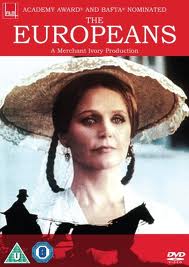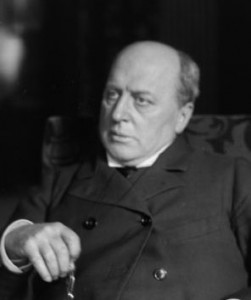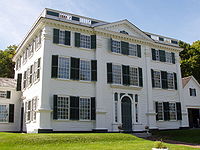“They don’t get the pleasure out of life that they might.”
When “the Euro peans” arrive unexpectedly to stay at the New England home of their strait-laced cousins, the Wentworth family, the conflicts between European and American values, so often highlighted in the novels of Henry James, are quickly established in this 1979 Merchant-Ivory film. Screenwriter Ruth Prawer Jhabvala stays close to the tone, themes, and action of the James novel as she brings to life a strict and pious New England family which is suddenly exposed to a whole new way of life. Felix Young (Tim Woodward), a charming and energetic European artist/actor/traveler, without prospects in Europe, has accompanied his sister Eugenia, Baroness of Munster (Lee Remick), to America while her marriage is being dissolved. Here, where no one knows them, Eugenia believes that “natural relations,” as opposed to the “artificial relations” of Europe will prevail.
peans” arrive unexpectedly to stay at the New England home of their strait-laced cousins, the Wentworth family, the conflicts between European and American values, so often highlighted in the novels of Henry James, are quickly established in this 1979 Merchant-Ivory film. Screenwriter Ruth Prawer Jhabvala stays close to the tone, themes, and action of the James novel as she brings to life a strict and pious New England family which is suddenly exposed to a whole new way of life. Felix Young (Tim Woodward), a charming and energetic European artist/actor/traveler, without prospects in Europe, has accompanied his sister Eugenia, Baroness of Munster (Lee Remick), to America while her marriage is being dissolved. Here, where no one knows them, Eugenia believes that “natural relations,” as opposed to the “artificial relations” of Europe will prevail.

Young Gertrude Wentworth (Lisa Eichhorn), always the most iconoclastic member of the family, is immediately smitten by Felix, finding him a welcome relief from the earnest but stuffy Rev. Brand (Norman Snow), who has been courting her. While Felix and Gertrude are discovering each other, Eugenia works her wiles on the Wentworth men, focusing both on Clifford (Tim Choate), the young son and Wentworth heir-to-be, and on neighbor Robert Acton (Robin Ellis), flirting and awakening them to new and exciting possibilities.
The late autumn foliage sets off the Federal Period homes (the exterior being the Barrett House in New Ipswich, NH, and some interiors from the Salem [MA] National Heritage site), all perfectly maintained and appropriately furnished, which serve as the setting for the action, and the cinematography (Larry Pizer), shows off naturally beautiful outdoor scenes (some of which take place in an elegant antique gazebo), along with dreadful rains and mud. The original score by Richard Robbins is one of the film’s highlights–romantic without being cloying, and often haunting. Jill Eichhorn, as Gertrude, is charming as she represses her sense of fun at the beginning and then lets go, under the influence of the captivating Felix.
 Well photographed, winningly scored, and beautiful to look at, this early Merchant-Ivory film is a lovely entertainment, but it does have two weaknesses. The father (as played by Wesley Addy) seems unrealistically puritanical, especially for a man who reads the transcendentalists, lives only seven miles from Boston, and is a Unitarian (not a dogmatic denomination). And Lee Remick, as Eugenia, is too mature for the role. In her mid-forties when she makes this film, her serious flirting with twenty-ish Clifford does not ring true, nor does her calculating manipulation of the family. Lacking the depth of the novel, the film is a wry and often humorous look at mid-19th century life.
Well photographed, winningly scored, and beautiful to look at, this early Merchant-Ivory film is a lovely entertainment, but it does have two weaknesses. The father (as played by Wesley Addy) seems unrealistically puritanical, especially for a man who reads the transcendentalists, lives only seven miles from Boston, and is a Unitarian (not a dogmatic denomination). And Lee Remick, as Eugenia, is too mature for the role. In her mid-forties when she makes this film, her serious flirting with twenty-ish Clifford does not ring true, nor does her calculating manipulation of the family. Lacking the depth of the novel, the film is a wry and often humorous look at mid-19th century life.
Notes: The photo of Henry James, part of the George Eastman Collection, appears on http://centerforfiction.org
The Barrett House photo is from Wikipedia.
The film poster is from http://dealoz.co.uk
Also reviewed here are six more Henry James novels and DVD editions. For the listings, click on the tab for Authors or Titles at the top of the Home page.
